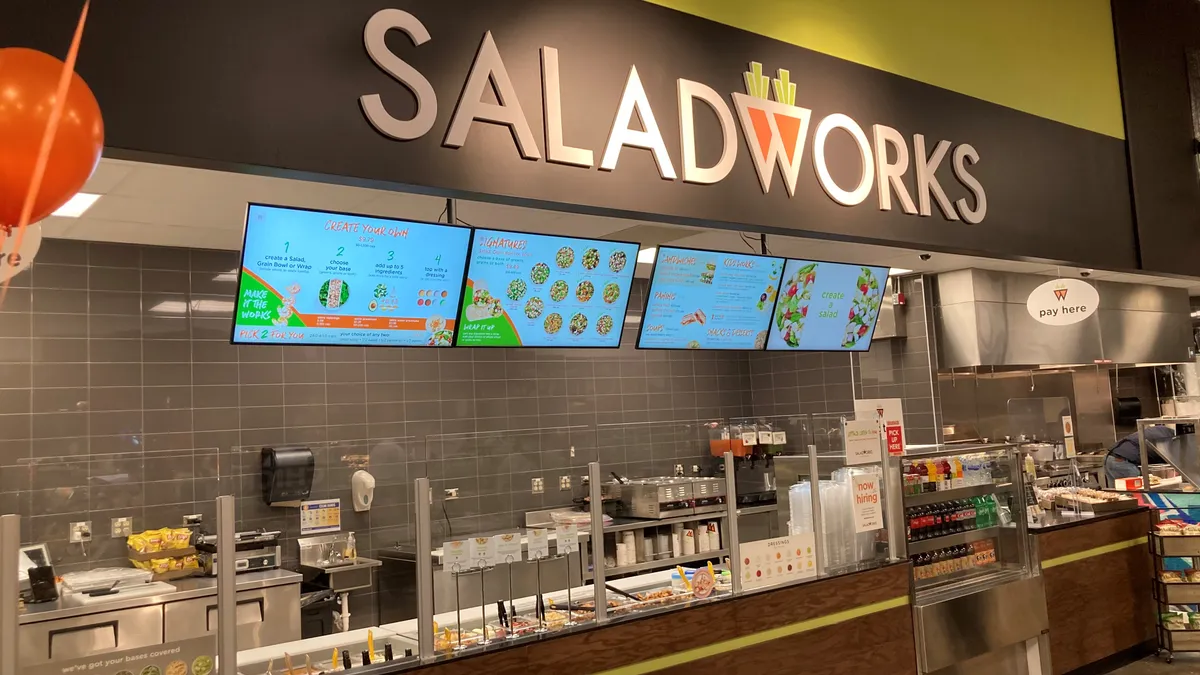Dive Brief:
- Woworks, which owns six restaurant chains including Saladworks, is adding seven virtual brands in a bid to open new revenue streams for its franchisees, according to a press release issued Wednesday.
- Woworks is teaming with Olo to deploy the virtual brands across its system. The two companies have been working together since January, when Woworks added Olo’s point-of-sale system and digital ordering and delivery program to all six of its traditional restaurant brands.
- This development follows volatility in the virtual brand market. Some brand platforms have collapsed as customers shift back to in-person dining and exercise greater discretion over their consumption due to inflation.
Dive Insight:
WoWorks’ investment in virtual brands, which will be spread across four of its six traditional restaurant concepts, suggests confidence in the sector’s potential. Virtual brands can offer operators lower labor costs and easy-to-execute menus, which can help grow a restaurant’s reach through off-premise channels.
Other restaurant companies are still betting on the space, as well. Nathan’s Famous, for example, has been expanding its virtual brand presence through partnerships with Franklin Junction and Nextbite. And at IHOP, virtual brands have become important drivers of off-premise sales.
WoWorks CEO Kelly Roddy said the additions align with existing brand identities and menus. He said they are a chance for “franchisees to add on additional revenue streams that can leverage their existing menu offerings in front of an increasing audience on third-party online food delivery sites."
| New virtual brand | Corresponding WoWorks restaurant operator | Description |
|---|---|---|
| Stack’d Sandwiches | Saladworks | Offers a wide variety of “hearty and flavorful soups.” |
| Soup Works | Saladworks | Offers “chef-inspired signature sandwiches and panini melts.” |
| Toasty | Frutta | Offers food that “elevates the humble toast into savory creations.” |
| Spoon Me | Frutta | Offers “decadent and energizing Acai, Pitaya, Coconut, blended kale bowls topped with delicious fruit.” |
| Sips | Frutta | Offers “refreshing and revitalizing smoothies.” |
| Titan Gyros | Garbanzo Mediterranean Fresh | Offers “Double-Stuffed Gyros.” |
| MacLove | Zoup | Offers “creative mac and cheese recipes.” |
According WoWorks, the success of third-party delivery aggregators has led to a lasting demand for delivery that these virtual brands are intended to meet.
Olo has been working with other chains to launch virtual brand offerings as well, most recently in a partnership with Hooters. The software company helped launch a digital food hall for three of Hooters’ virtual brands. Despite this deal and a partnership centered on remaking Denny’s loyalty program, Olo cut 11% of its staff in June as part of a strategic reorganization.
Despite innovation by some chains in virtual brands, this business model — along with the ghost kitchen segment — have had a tumultuous year. The issues in the sector first came to light last spring when Butler Hospitality, a hotel ghost kitchen company that offered a suite of five brands, collapsed.
The next thirteen months saw multiple rounds of layoffs at virtual brand platform Nextbite. This disruption culminated in a sale of Nextbite to C3 founder Sam Nazarian. Brinker also eliminated its virtual brand Maggiano’s Italian Classics. In March, Uber Eats announced an initiative to cut down on the number of duplicate virtual brands on its platform, while also connecting restaurant operators with certified virtual brand platforms.













